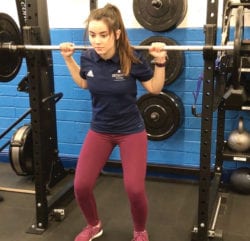When Leah was around five years old, she watched her grandmother, who had Type 1 diabetes, test her blood glucose levels by finger pricking. She told her grandmother she would “hate to have to do that”. However, at the age of 12, she too was diagnosed with the condition.
While many people with Type 1 diabetes do not know many or any other people with the condition, Leah was in the unusual position of having a number of relatives with it.
“My granny, granddad, three great uncles, uncle, aunty and cousin all have it. In fact, my cousin was diagnosed the same week I was,” she explains.
Now aged 21, Leah recalls some of the telltale symptoms she had around the time of her diagnosis.
“I was really exhausted, and I was drinking so much milk because of the thirst. I was also losing so much weight,” she says.
Because of the strong family history of Type 1 diabetes, her mother had a “fair idea” of what was wrong. Leah was brought to the GP, who sent her straight to hospital, where she stayed for the next week.
She remembers feeling “overwhelmed” in hospital.
“I had to have my blood glucose levels checked regularly, even when I was sleeping, so I would wake up to them checking my bloods. I didn’t like injections and still don’t, so I remember injecting and crying. I also remember being told I couldn’t eat too many grapes and I loved grapes!”
Luckily, her mother had some experience with diabetes as she would have dealt with Leah’s grandmother having hypos over the years. Leah says that it was also nice to have relatives who knew what it was like to have diabetes. However, despite this, she didn’t always find it easy to talk about.
“Even though when I was young, I had a lot of family members with Type 1, I felt shy talking about it and was very aware of myself. I think people with no family members must also feel shy talking about it. They may want to hide certain things, like they may not want to take their insulin in public. But you have to realise it’s normal and you have to do it,” she insists.
She also believes young people might keep it to themselves if there is something wrong.
“Pay attention to the condition and tell someone if something is not right. It’s not always just your hormones. It could be something else,” she notes.
In her teens, she experienced high ketones and was at risk of DKA.
“I remember being told about DKA in the hospital but thinking that would never happen to me. I remember being in my early teens and I was still getting to grips with everything. My ketones got really high, and I felt numb and just awful like I wasn’t there. I didn’t pass out, but I had that ‘almost there’ moment. I checked my ketones and they weren’t good,” she recalls.
Since then, she has had many other things to figure out. She embraced technology early on and has been on a pump “for years”. She has used the Freestyle Libre and is currently changing over to the Dexcom.
Socialising is obviously a major part of a teenager and young adult’s life and this has brought new challenges.
“Alcohol was a tricky one to learn about. And even clothes came into it. Sometimes if I was wearing a dress, there was nowhere for my pump to go, so I would take the pump off and bring my injection with me,” she explains.
While there is a lot to learn when it comes to diabetes, Leah reminds people that they are “not alone”.
“More people are starting to slowly understand the condition. Don’t keep your voice in the dark. If there is a problem, tell someone,” she adds.


